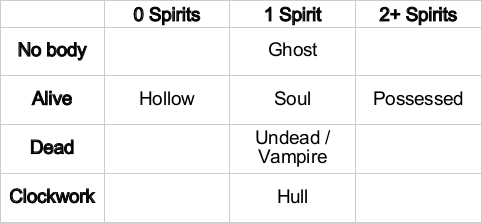The Back Pocket.
Every game I run has one. That is a metaphorical space where I tuck away things I want to use in the game, ready to be pulled out when the time is right.
It can be concrete, like a table to roll on or a stack of note cards or a Word document with a column of stream-of-consciousness phrases. Maybe you have a folder on your computer with pictures, portraits, and documents, or maybe you have a Pintrest board. Or it can be something you keep in the back of your mind, if your mind is organized that way.
I learned a very important lesson. SOMEDAY will probably never come for your campaign. So, if there are things you want to use, jam them in as quickly as you can. Build the whole game around the coolest things you can think of doing in the setting with the characters.
That is related to another idea: if you do all the coolest things you can think of, you won’t run out–you will think of more cool things. There is no finite amount of coolness. It is more like a muscle; the more it is used, the stronger it gets, where if it is held in reserve too long it atrophies.
A third idea about the back pocket: participation is different than spectating. You can take the loose plot of your favorite movie and use it for inspiration to set up a situation in the game. You can repurpose characters as NPCs. Steal liberally from your favorite monsters, magic, and challenges.
The reason this is okay is because your players may have seen Predator, but that’s not the same as playing in a game where there is a Predator hunting in their city. The shift from audience to participant adds the necessary novelty.
We rely on formula to make things familiar enough to be enjoyable. We don’t want the exact same thing over and over, but we do like recognizable plot structures, ancient stories told in new ways, and interesting executions of basic well-explored themes.
In summary, fill up your back pocket! Be intentional about it. Collect and organize your ideas for stories, NPCs, cool places to show off in the game, excellent treasures, exciting challenges, and so on. Pull out your very favorite ones and get into them as quickly as you can–tomorrow may never come. And don’t be shy about stealing intellectual property for your game table; show off the best of why you like it, and use those booster rockets for your own cool execution.
The best part of the back pocket is you don’t have to force it. One of the brilliant parts of Blades in the Dark is it is very, very low prep. For the first little while, you don’t know what they’ll latch on to, which way they will go. What you CAN do is think up some people who might need help, and some jobs they might pull the crew into. You can put some general thought into scores you’d love to showcase for your players.
When you are on the spot and have to improvise in a hurry, you GET to showcase things from your back pocket, instead of being forced to make something up on the spot. Keep the prep low, and the inspiration high, and that’s the mix that will burn like rocket fuel and make Blades in the Dark soar.

